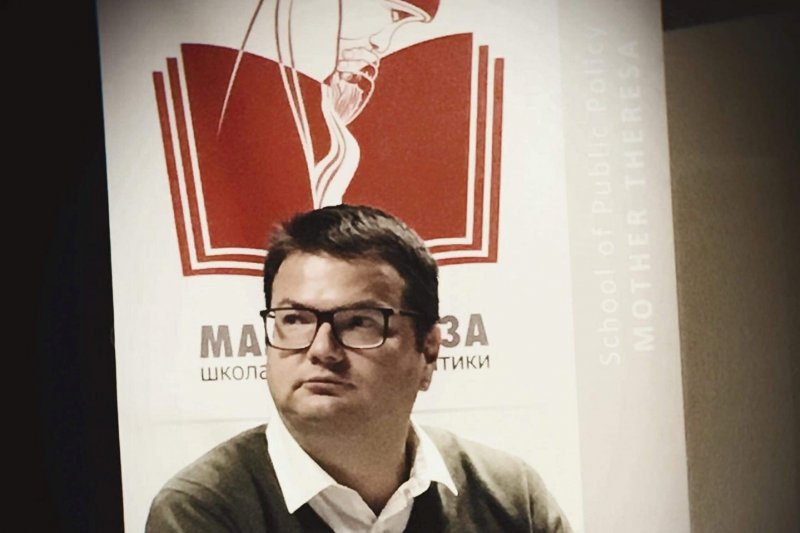Tirana, Skopje Need Open Minded Politicians
The war in Ukraine has turned into a confrontation between Russia and the West at the moment and the European nations are among those most affected as the Russian energy was and is the easiest available and cheapest source on the market, has said Zhidas Daskalovski, Professor of political science at the University of Kliment Ohridski, Faculty of Security and Director of the School of Public Policy Mother Teresa, supported by the Council of Europe, in an exclusive interview with Albanian Daily News.
“If the war drags on economically hard times, inflation and social unrest with governments falling are easy to predict everywhere in Europe,” said the Professor.
According to him, the vast majority of ethnic Macedonians are against the 2017 Friendship treaty signed with Bulgaria and the Prespa agreement signed with Greece in 2018. Referring to Skopje’s last request to extradite former PM Nikola Gruevski, he was of the opinion that it is groundless as he has been granted asylum by Hungary.
Professor Daskalovski thought that there is no enlargement on the agenda of the EU in the near future, and he was afraid that this is also true in mid-term perspective.
Asked about the ‘Open Balkans’ initiative the professor was positive and mentioned as an achievement of it the reduction of the roaming charges, which, according to him, “was an excellent project”. “Traffic of people and goods must be quicker. We cannot have a situation where you travel free and quickly around Europe and get stuck on Balkan borders.”
Albanian Daily News: Professor thank you very much for this opportunity. As it is the first time that you are a guest to Albanian Daily News please could you say a few words about your career, academic and political interests, and secondly, how do assess the current co-existence of the people in the multi-ethnic North Macedonia?
Professor Zhidas Daskalovski: I am professor of political science at the University of Kliment Ohridski, Faculty of Security and Director of the School of Public Policy Mother Teresa, supported by the Council of Europe. Macedonia is like all countries in the Balkans, multi-ethnic and Albanians are the second biggest community after Macedonians.
Although occasionally there are some tensions and incidents generally relations among the two groups are fine, people are more concerned about socio-economic issues than ethnic questions.
- The Ministry of Justice demanded the extradition from Hungary of the former PM, Nikola Gruevski, who has been granted asylum in Budapest. My first question is about the timing of the request: why is it made now and are there hopes that Hungarian officials will extradite him. Secondly, does the VMRO-DPMNE party really need his return as Gruevski is known for his pro-Serbian, pro-Russian, and anti-EU stance, and he is anti-the 2017 Friendship treaty signed with Bulgaria and the Prespa agreement signed with Greece in 2018?
- In fact, the vast majority of ethnic Macedonians and consequently the plurality of all citizens, are against the 2017 Friendship treaty signed with Bulgaria and the Prespa agreement signed with Greece in 2018. VMRO-DPMNE party is the biggest party in the country and does not need Gruevski's support. The Ministry of Justice's request to extradite him from Hungary is groundless as he has been granted asylum and cannot be sent back to Macedonia as his convictions are deemed political. In principle, all the cases against Gruevski were made on flimsy grounds.
- North Macedonia and Albania have got the green light for the opening of the intergovernmental talks with the EU. A step in the right direction, but, Professor, given the past experience do you think Brussels or better to say certain anti-enlargement countries in the Union will pursue a new approach unlike the previous obstructionist attitude?
- Although there are EU-enlargement enthusiasts among member states, there is no enlargement on the agenda of the EU in the near future, and I am afraid that this is also true from a mid-term perspective.
- Which are your expectations of the future endeavor of North Macedonia and Bulgaria to overcome their complex differences, and in your view will the French proposal, which helped the unblocking of the further progress of the EU accession process for North Macedonia and Albania, keep the momentum in this direction?
- The progress is not unblocked as the requirement is for Macedonia to amend its constitution and add ethnic Bulgarians as one of the recognized groups. There needs to be a consensus among the MPs regarding this and 2/3 majority is required, but the opposition is against.
However, even if this hurdle is surpassed, the EU negotiations can drag for years if not decades if there is no will for speedy accession in Brussels, Berlin, Paris or the Hague, which is lacking at the moment.
- The situation in the Western Balkans is far from being stable as disputes sometimes turning into dangerous confrontations seem ‘boiling’. Do you think that ‘Open Balkans’ initiative has potential to contribute to pacify the region; bearing in mind that the ‘Berlin Process’ has had the full support of the EU?
- Any initiative for cooperation is good and I do not see a situation of ‘Open Balkans’ versus ‘Berlin Process.’ The more practical issues are covered the better. Reducing roaming charges for example, was an excellent project. We also need to open many more border crossings and simplify border checking procedures, even get away from them, in the style of the Schengen regulations. Traffic of people and goods must be quicker. We cannot have a situation where you travel free and quickly around Europe and get stuck on Balkan borders.
- Ukraine war goes on. Professor, how do you see the impact of the first war on lands of the European Continent since the end of WWII, namely the Russian aggression against Ukraine? Might its aggravation cause social unrest in the most affected countries by the overall crisis?
- The war in Ukraine started in 2014 and the problem is deep and complex. At the moment it has turned into a confrontation between Russia and the West, the European nations among those most affected as the Russian energy was and is the easiest available and cheapest source on the market. If the war drags on economic hard times, inflation and social unrest with governments falling are easy to predict everywhere in Europe.
- To conclude, Professor, how do you assess the relations between Albania and North Macedonia?
- Macedonia, as far as indicators show, was much more attractive to foreign investments, and was even better than Serbia during the reign of Gruevski. Since 2017, economic development of the country has stagnated.
We need better cooperation between the countries. At the basics, we need more and better functioning border crossings, faster roads and rail links. You need smart and open minded politicians on both sides of the border. For example, although envisioned, a boat line between Pogradec and Ohrid has not been implemented for years.














